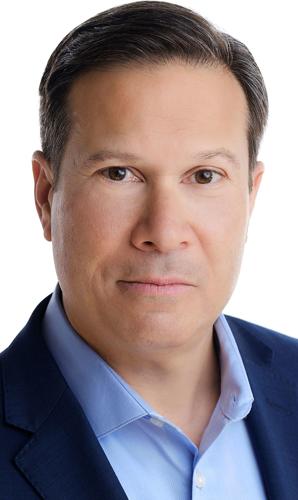You may have seen Frank Figliuzzi on TV, talking about politics and national security before a backdrop showing the unmistakable landscape of Tucson.
Get used to it.
Figliuzzi, who retired from the FBI in 2012 as assistant director in charge of counterintelligence, moved to Tucson with his wife in late 2018.
Over his 25 years in the bureau, he had previously worked as a counterintelligence agent in Atlanta and Washington, D.C., ran a squad investigating economic espionage in Silicon Valley, served on the bureau’s internal affairs department and helped lead offices in Miami and Cleveland.
Now he is in greater demand than ever on the NBC channels where he is a paid analyst, since Special Counsel Robert Mueller handed in his report on Russian interference in the 2016 presidential campaign.
The fact that the report remains confidential has increased the demand for someone like Figliuzzi to tell us what he thinks is going on.
Attorney General William Barr released a letter Sunday detailing what he said are the report’s main conclusions: That neither President Trump nor his campaign team conspired with the Russians who were trying to help them win, and that Mueller could not conclude whether the president obstructed justice.
I spoke with Figliuzzi first last week, before Mueller turned over his report. Then we checked back in this week to discuss the new developments. Here are the high points of our conversations, edited for brevity.
Q: What brought you to Tucson?
A: My youngest son and his wife just had a baby girl. So, we have a grandson in Houston, and we have a granddaughter now about 14 weeks old here. And my daughter-in-law is at Tucson Medical Center in a residency program. We thought, “They’re going to need some help.”
For the first time in our lives, I’m not tied to an office and a 9 to 5 job. We’re here to help, and it’s a great place to do that. We’ve just closed on a home in the Catalina Foothills. So we will be here for the foreseeable future.
Q: What’s it been like since the Mueller report was filed?
A: I’ve been on (TV) pretty much nonstop, starting Friday afternoon through the weekend.
Q: How did you end up on TV?
A: For years, I was unable to talk in detail about the classified work of counterintelligence. And if I did, it still had to be very constrained. I left the FBI and went to corporate security, at a high level for General Electric. Again, the media would come calling and say, “Frank, can you comment on this development, this national security matter?” Because I had a corporate tie, understandably the corporate world is not too big on commenting in the media about international events that might impact their business.
When I retired from GE, the media said, “Can you talk now?” And the timing was perfect because here comes the special counsel inquiry, and all things counterintelligence — Russia, the threat and risk to our system of elections. I found quite a national interest in this topic.
Q: What is your take on the Barr letter explaining the Mueller report?
A: I’m as puzzled as just about any other pundit is, and I worked with Bob Mueller. I think we don’t have enough information yet to truly know what his intentions were. The appearance that he punted a difficult question (obstruction of justice) to the attorney general does not sync up with my knowledge of Mueller.
If I have to try and read those tea leaves, I’d say that Mueller may have intended for this question to go to Congress and be aired out there. He’s simply not the kind of person to avoid making a hard call.
Q: What did you think of the apparent finding that the Trump campaign did not collude with Russian efforts to influence the campaign?
A: The issue of no criminal conspiracy or coordination being found does not surprise me. I never thought that the counterintelligence investigation would result in chargeable crimes against the president. In large part, that’s not what counterintelligence is about.
This whole thing started as a Russian counterintelligence case and it needs to end as a counterintelligence case. One of the worst things that can happen with this so-called exoneration, as the president termed it, is the public will say “meh.” Quite the opposite: a foreign adversary interfered with the election.
Q: What do you think about the president attacking the FBI?
A: The most disturbing thing about all of this is that the public is getting a daily dose of venom by the president directed toward our institutions — the Department of Justice, the FBI and the intelligence community. This is harming our nation.
Somewhere in Tucson today, an FBI agent is going to take out his credentials, display them to a member of the public, and ask them for help. Could be a kidnap case, a bank robbery or a white collar crime case. That member of the public is going to have to make a split-second decision whether to help that FBI agent or not. I worry deeply that that member of the public’s perception of the FBI has been tainted by our president.
Q: But doesn’t the president have reason to criticize the FBI, considering the texts and other behavior by agents such as Peter Strzok and Lisa Page?
A: I am deeply troubled by the behavior of a couple of FBI officials that have tainted the public’s perception of the FBI, which will likely take years to overcome. Pete Strzok and Lisa Page exercised horrific judgment, not just in having an extramarital affair but in using FBI phones to text message each other and include in that statements about the campaign that should never come out of an agent’s mouth.
Is it OK for a FBI agent to have political beliefs? Of course. But while you’re running a major investigation of a campaign and its candidates, you should not be texting political preferences and ideas. Were their preferences shaped by the intelligence they were seeing in front of them? Oh yeah.
Q: What do you think should happen with the Mueller report?
A: Things need to be declassified. Grand jury material needs to be made open, and the public needs answers.
Clodfelter lobbying?
The Arizona Secretary of State’s office is looking into whether former state Rep. Todd Clodfelter has been lobbying this year in violation of state law.
Clodfelter, a Republican who represented Legislative District 10 for one term before losing in 2018, has appeared at the state Capitol this session on behalf of the Arizona Cosmetology Association, the Yellow Sheet Report revealed in February. It’s illegal for a former legislator to lobby the Legislature within a year after leaving office.
Clodfelter and his wife have long been involved in the cosmetology industry, and last June, while he was still in office, Clodfelter established the Arizona Cosmetology Association, according to state records. The association’s lobbyist is listed in state records as Karla Kestner-Clodfelter, the former legislator’s wife.
The name of their lobbying firm is Tag Team Strategies LLC. The Yellow Sheet reported that Clodfelter accompanied his wife to meetings with Sen. David Gowan and other legislators.
But Todd Clodfelter said in a response to the Secretary of State’s office that he is not lobbying, just accompanying his wife, who had surgery in the weeks before the Capitol visits.
“Mr. Clodfelter’s role at Tag Team does not make him a lobbyist,” his lawyers said in a formal response. “Mr. Clodfelter made clear that he did not communicate with lawmakers during those meetings; and that the lawmakers involved confirmed his account.”
Any formal investigation would have to be done by the Arizona Attorney General’s Office, if it gets that far.
Sedgwick eyes supe seat
Tucson Unified School District board member Rachael Sedgwick is setting her sights on a seat on the Pima County Board of Supervisors in 2021, but says she is still focusing on helping children in the first phase of her political career.
Sedgwick, who will run as an independent in District 5, said she wants to focus on economic development and bringing jobs to Pima County, saying a better economy will bring more resources into classrooms.
“As a supervisor, I could bring in four years, I could work with people to bring 10,000 jobs and minimum, $20 billion in investment into Pima County,” Sedgwick told the Star on Thursday.
Sedgwick did have some troubles right out the gate in her announcement, initially filing with the county to run in District 3 — currently represented by Sharon Bronson — and indicating she would run as a Republican.
On Thursday, she said she made mistakes in her initial filing and plans on running in District 5, where she will challenge Democrat Richard Elías.







